Joy, fear, resilience: Brevard's transgender community reflects on Day of Visibility
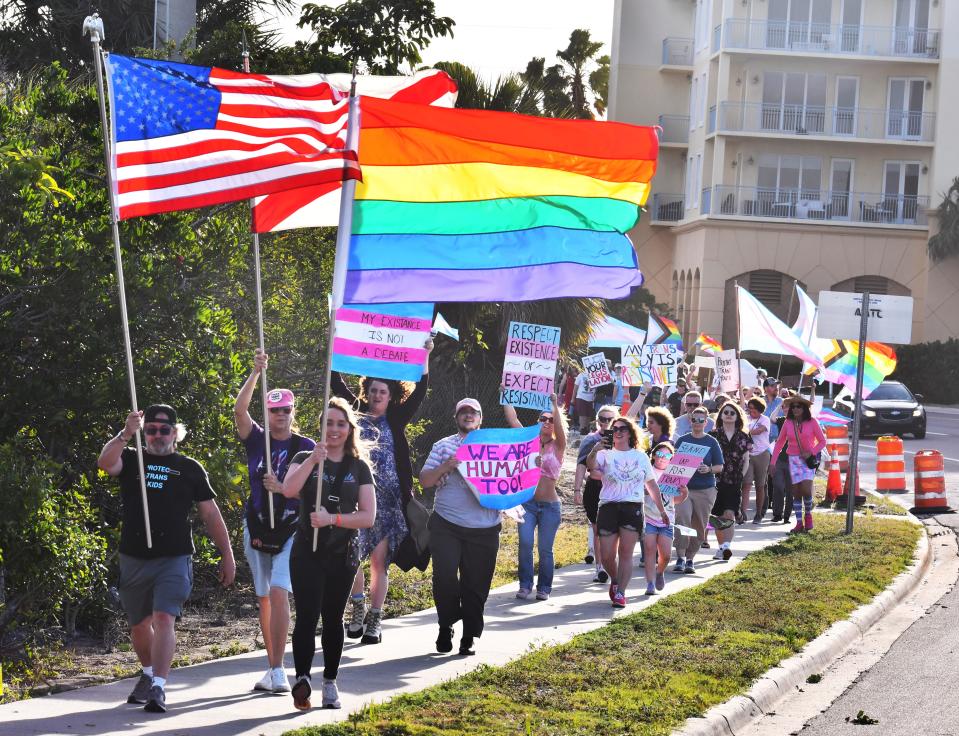
They’re the boogeyman in the Florida Legislature. They make up only half a percent of Florida’s population, but 18 pieces of state legislation filed this year target their personal freedoms.
Their very existence has been questioned by some lawmakers, with their health care repeatedly equated to mutilation by Gov. Ron DeSantis despite it being backed by most major medical associations in America.
And yet, members of the transgender community in Brevard describe their lives as something far more ordinary. They shop at Costco and take pride in holding a membership card with their chosen name on it. They enjoy spending time with their family and friends. They work jobs, attend synagogue, visit nightclubs.
Amid the averageness of their lives, there are added worries. The lack of single-stall bathrooms throughout the county sometimes deters them from venturing far from the safety of their homes. They fear their life-changing medical treatment may suddenly be torn away.
The state has already banned that health care for trans children and teens. If the Republican-controlled Legislature gets its way, insurance policies will be barred from covering transition-related medical care for adults. Teachers will not be allowed to call trans students by their chosen name and pronouns, even if their parents are OK with it. And trans adults will face possible criminal charges for using restrooms that match their gender rather than their sex assigned at birth, not just in schools, but in restaurants, movie theaters and health care facilities.
But on Friday, smack in the middle of what's amounting to a harrowing lawmaking session for trans Floridians, came International Transgender Day of Visibility, an annual day of awareness and celebration. On the Space Coast — represented by one of several lawmakers pushing anti-trans legislation, Rep. Randy Fine — that meant coming together in celebration, solidarity and protest. Spektrum Health, a nonprofit LGBTQ health provider with clinics in Melbourne and Orlando, held the event at Eau Gallie Square Friday night.
“Right now, what we’re doing is trying to raise awareness, trying to increase visibility and understanding in the community,” said Joseph "Joey" Knoll, founder and CEO of Spektrum and an APRN. "There's a fire in our state right now, and there are people who can't evacuate. ... And for them, this is why I'm staying."
About 250 community members attended, decked out in rainbows and trans pride colors, holding pride flags and waving signs. There were speeches, songs and a multitude of hugs exchanged between friends and strangers alike.
To mark the day of visibility, FLORIDA TODAY spoke to five transgender people in Brevard. They come from different backgrounds and grew up in different generations, but they share many of the same desires, fears and challenges.
These are their stories.
Willow: Jewish, queer, forced to flee
For generations, state violence has forced Willow Noa’s family to flee their homes.
In 1907, their Jewish family fled Eastern Europe because of the pogroms that led to the foundation of the Nazi party. Their father’s side of the family fled Cuba — no one has told them specifically why, but they believe it was because they were also Jewish.
Now, 21-year-old Noa, who has lived their whole life in Melbourne, is preparing to flee again.
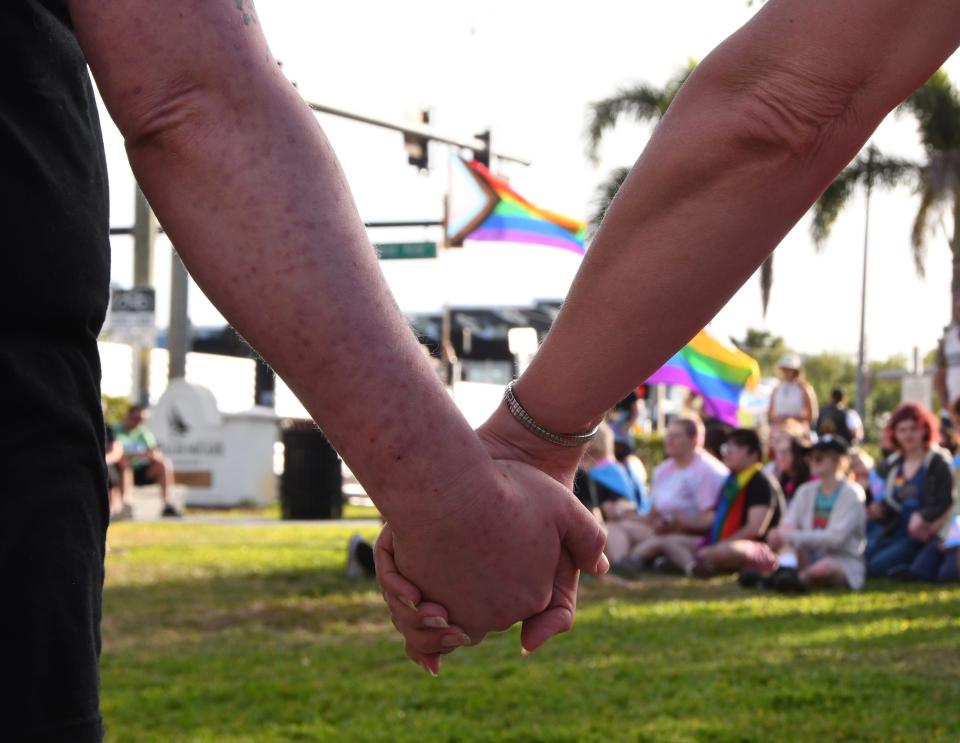
“My boyfriend has two (trans) siblings, so his whole family has to move,” they said. “I should probably go here too in a second, honestly, out of the state, because there (are) just not a lot of resources for the type of life I want to live, which is a happy, joyful one as a queer Jew.”
Noa grew up with support. Their mother was a gender studies professor and had numerous queer friends. At about age 11, they started attending Rainbow Youth, and at age 12, they came out as nonbinary and bisexual.
It was a life many of their peers weren’t afforded, they said.
“I had no friends who were not abused pretty much unilaterally,” they said. “I had almost no friends who were not often getting admitted into local mental hospitals. … That was just the situation from the time I was 10 until the time that I was about 16.”
Life outside home and their Jewish community wasn’t easy. Many teachers refused to use their name and pronouns or step in when they were bullied by classmates. Though they received some support in the gay-straight alliance at Melbourne High School, they were harassed by other students. Eventually, they dropped out and finished high school online.
Noa is now facing the likelihood of having to move.
“We don’t know where we’re going to go, what it’s going to be like,” they said. “I’ve never lived anywhere else.”
The trauma it brings up about their family’s history is inescapable, they said.
“We don’t have records of (my great-great grandfather’s) family, because two years (after he fled Ukraine), the Nazis came and buried 3,000 of them in a grave, and that’s something I think about almost every single day now,” they said. “And it sucks — it sucks to have to constantly think about that, but I don’t have a choice.”
While they’re grateful to have the resources to be able to move, it’s a scenario they wish they weren’t facing.
“There’s so much history in my family of us having to move because of the state, and I had really hoped that we would be able to go a generation without that, maybe two,” they said. “But that’s not the reality here.”
More: The parent of a transgender child asks: What about my parental rights?
Ash: Euphoria despite challenges
The past year has been one of both deep joy and extreme challenges for Ash. The 36-year-old Brevard resident asked that their last name not be shared for safety. Though they grew up hating the feminine roles they were forced into, it was only over the past year that they came out as trans nonbinary.
Finally being true to who they are while facing a national rise in transphobic legislation is difficult, they said.
“It’s such a catch-22,” they said. “It’s like finally, for once in your life, being able to be yourself and finding your true self … and that part is literally euphoric, there’s nothing in the world like just being able to be yourself … and then to face such hatred outside, it’s like — it’s difficult, it’s extremely difficult.”
The challenges come in various areas, but for them, one of the most frustrating things has been the lack of safe access to public restrooms. Bathrooms that are not single-stall and unisex generally don’t feel safe, which makes driving to Orlando, spending a day at Disney World or even just running errands in Brevard difficult for Ash.
“I’m constantly like, ‘Oh no, I don’t want to go there. Oh no, there are too many people. Oh no, there are only men and women bathrooms there,’” they said. “It’s extremely challenging.”
They use the app Restroom Refuge, a resource for gender-nonconforming, intersex and trans individuals who may feel more comfortable using a unisex bathroom. The map displays only three unisex bathrooms in all of Brevard.
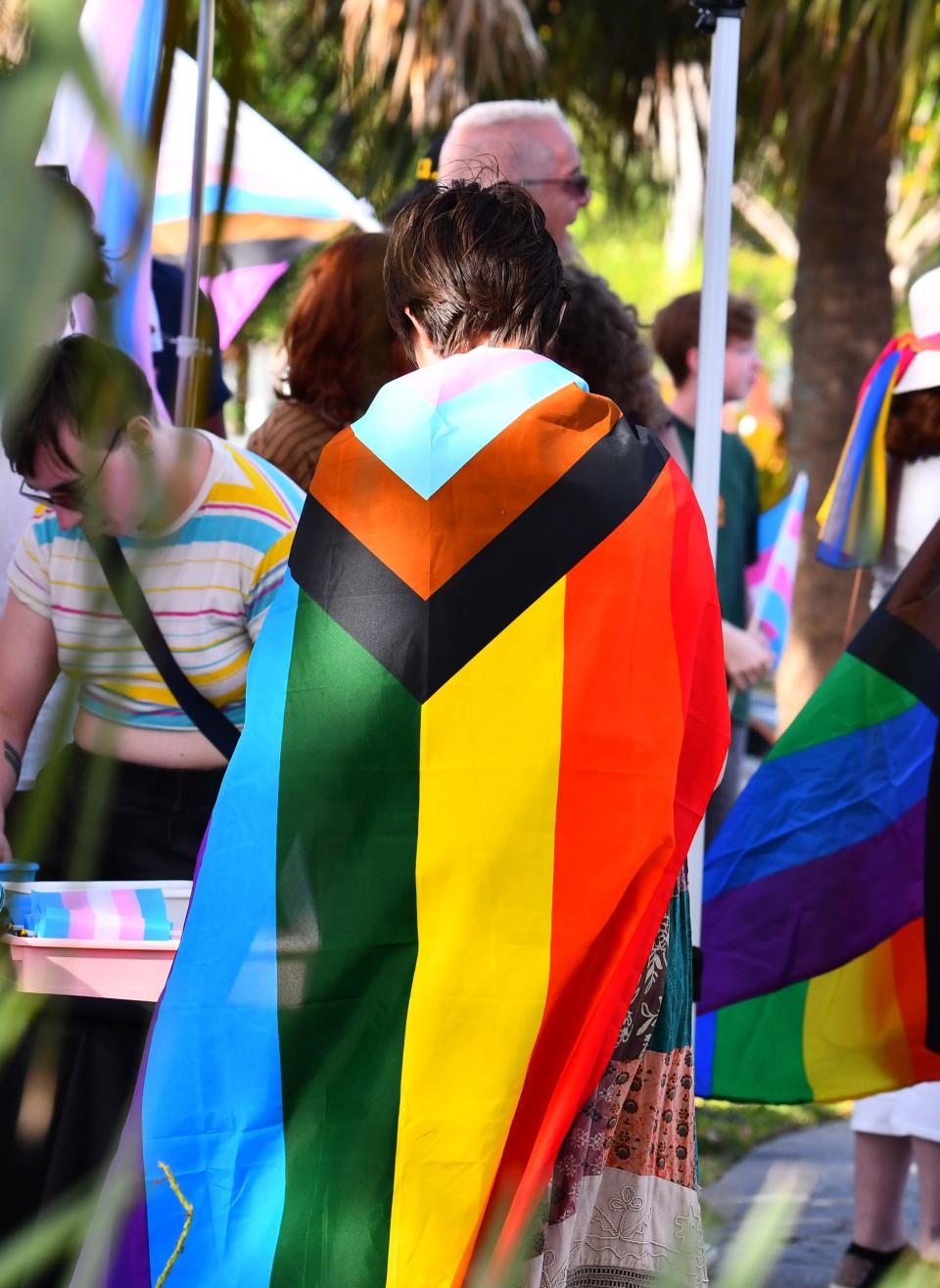
When Ash has used the women’s room, they’ve faced harassment.
“I get called 'sir' and told to come out; I get looked at funny,” they said. “It’s tough.”
Not being able to listen to the needs of their body while they’re out and about is a deeply frustrating and degrading feeling, they said.
“I feel like the lowest level of civilization that is treated inhumane," they said. "Inhumane.”
Alexandra: Joy in life's simple pleasures
For Alexandra Steele, walking through Costco with her membership card and driver’s license in hand brings a sense of euphoria. It may seem like a small thing, but the 70-year-old transgender woman never thought she’d see her name on her ID or birth certificate — a legal change that often takes months and can cost hundreds of dollars.
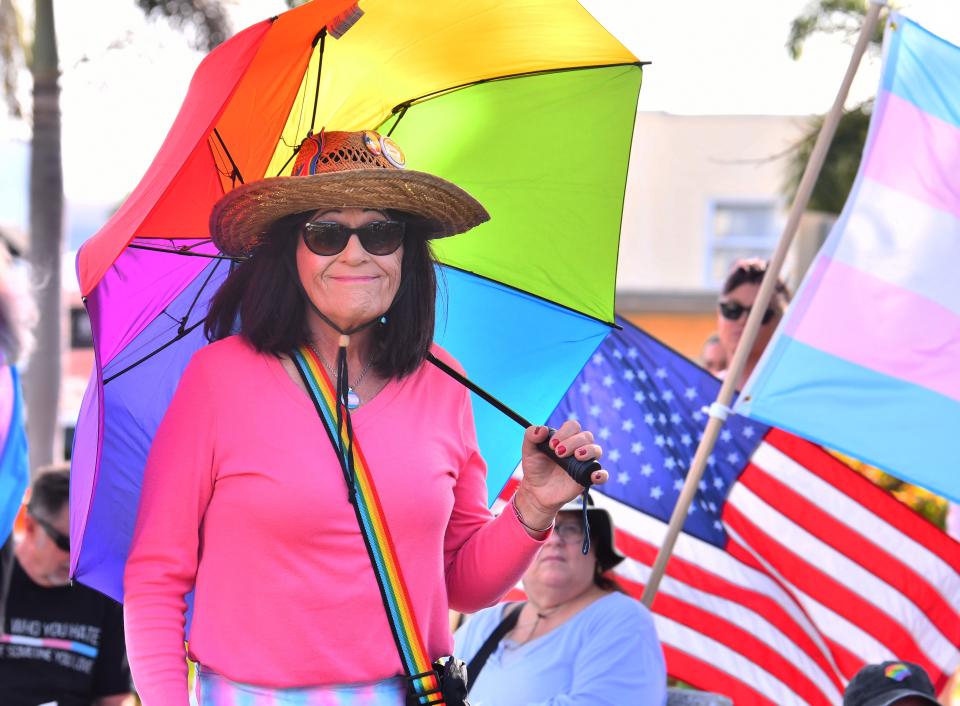
“To have my own driver’s license is like … there’s nothing like it,” she said. “Now I’ve got the driver’s license and the picture says I’m female. … nobody can say anything to me. That really is just unbelievable.”
It was only about two weeks ago that she was able to complete the four-month-long process of changing her name and gender marker on all legal documents. The process required multiple letters from her doctor and that she be on hormone replacement therapy for at least a year prior to her legal name and gender change. A proposal moving through the House, sponsored by Fine and Rep. Dr. Ralph Massullo, would bar that marker from being changed on birth certificates.
Raised in a Christian household, Steele recalled her childhood as a “rough-and-tumble time” in Detroit’s inner city. In high school, a tank was stationed on the corner near her home, a response to 1967 riots that culminated in response to racial segregation.
As a child, she would try her mother’s clothes on in secret and eventually dress in women’s clothes and sneak out once she learned to drive. But she didn’t have a word to describe who she was until she happened to see a group of transgender people on TV.
“I almost had a stroke,” she said. “‘There (are) other people like me!’ Oh my goodness.”
Though that realization took place decades ago, her transition journey has spanned her whole life. In her early adulthood, she remained closeted to maintain a job as a dental technician in Detroit. But when she suffered a near-fatal car accident that left her with numerous broken bones, she moved to Michigan’s upper peninsula, living in the wilderness for about 30 years.
Though she sometimes visited Duluth, Minnesota, a place she described as accepting, she didn’t seek gender-affirming health care until several years after she had moved to Brevard, when Spektrum founded their Melbourne clinic.
Before that, it was “too scary to go anywhere else,” she said.
“They’ve been really great,” she said. “It’s been like, ‘Oh my god, I’m finally getting some of the help I really needed for years and years.’”
Sapphirah: Drag and self-exploration
For Sapphirah Jade, understanding her identity was a process that took years. The 22-year-old West Melbourne resident only recently came to the realization that she is transfeminine. The realization came after years of alternating between suppressing who she was and self-exploration.
She’s grateful to have had that time, but fears for the future.
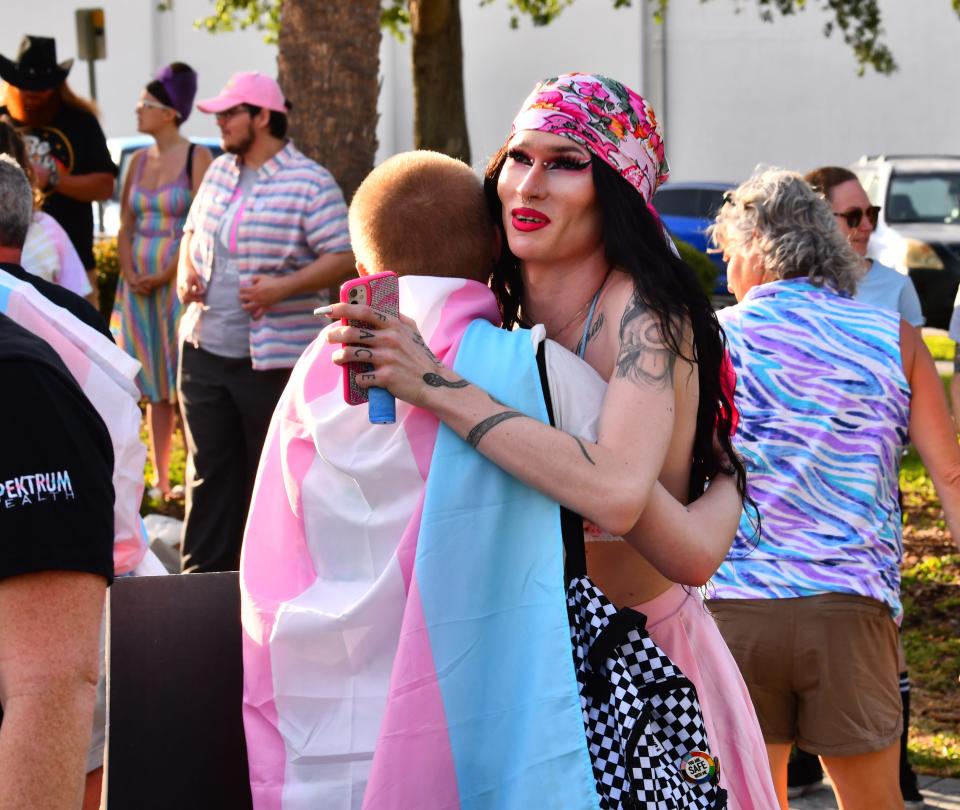
“With these bills being passed, I don’t think that there is that time left,” she said. “I don’t think that I have as long as I felt I had to kind of figure out my identity, to really have the resources I had, and if I am feeling that way, I can’t even imagine how the trans youth (are) feeling knowing that in a matter of a few votes, a few yesses, all of their rights are going to be stripped away.”
Jade, a Brevard native, grew up in a Christian household with two older brothers and a younger sister. It was fueled by testosterone, with an emphasis on manly men and sports, she said. She was punished for playing with Barbies and mocked for her femininity in school, pushing her to try to blend in with the boys by middle school, she said.
“I really had no, absolutely no feminine institute to look up to or to (aspire) to,” she said.
As a young adult, she struggled with homelessness, experimentation with drugs and alcohol and suppressed her identity for a long time, she said. Now, with help from a past partner and her father to get out of homelessness and become sober, and given the time to understand herself better, she can’t help but wonder if she would have faced fewer struggles if she’d had support and representation when she was younger.
“I grew up thinking HIV was purely a gay disease,” she said. “I didn’t know anything about anything. And because of that, when I was by myself, it would launch me into those pits because I’m left alone, not knowing anything, not knowing who I am.”
Through the struggles, there’s been a bright spot in her life: drag. After experimenting with makeup and wigs in high school, it became a way for her to play with her expression and learn about herself as an adult. She attended the Salon Professional Academy in Melbourne at age 19 and began playing with more experimental looks.
“It really kind of (became) my biggest hobby now,” she said. “I really kind of hypered in on that hyper femme side of myself.”
Jade hopes to take her drag looks to the stage soon and perform this year at the Twisted Rooster in Melbourne, Brevard’s only LGBTQ bar. But amid that hope is the awareness that her safety is “always at risk.” In the past three months, strangers have begun questioning her and even following her into the bathroom. She believes the negative rhetoric about transgender people and bills targeting the community have emboldened them.
“I’ve had people come up to me and ask if I’m on estrogen, I’ve had people ask me if I have a vagina or a penis, I’ve had people ask me if I’m planning any surgeries — questions that just would not have been brought up if people did not have that comfortability now,” she said. “It just wouldn’t have happened before. These things did not happen to me before.”
Sebastian: A fresh shot at life
Sebastian Cook knew he was different since elementary school. By late middle school, he knew he was transgender. He didn’t get to start taking testosterone until October 2022, a few months after he turned 18.
He thought that day would never come, and it nearly killed him.
He attempted suicide five days after his 18th birthday.
“I thought that if I started testosterone that I was going to lose everybody that I love,” he said.
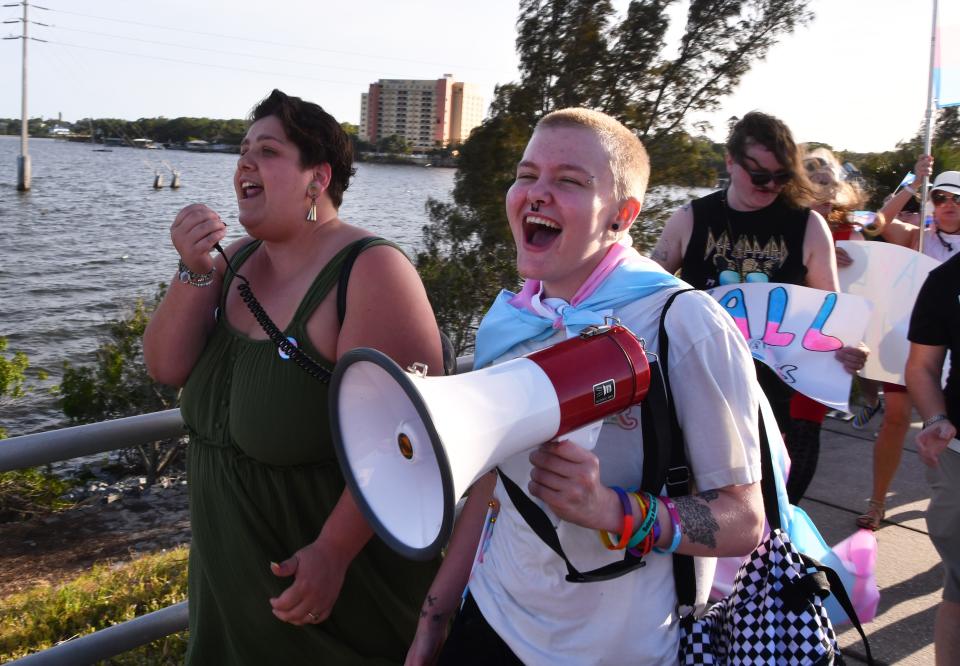
“If I wasn’t able to start testosterone, or if I didn’t see that top surgery was an option for me, I thought that I wasn’t going to be able to live,” Cook said. “And it’s true — if I didn’t start testosterone, I truthfully would be dead right now.”
It’s a sentiment that is repeated often, he said, but has proved true for him. From the moment he took his first testosterone shot, he felt different.
“It felt like I was starting over, like I finally got a real shot at life,” he said.
It’s not a solution to all his problems. He still deals with transphobia every day at work, his gender dysphoria still acts up and life isn’t perfect. But he’s starting to feel more comfortable in his skin.
“It’s the way that the testosterone is slowly but surely making it so that my physical body and the way that I sound, the way that I look, the way that I stand — all those things are finally aligning with the way that I see myself, the way that I feel on the inside,” he said.
“It’s starting to make this body almost feel like home.”
Finch Walker is the education reporter at FLORIDA TODAY. Contact Walker at 321-290-4744 or fwalker@floridatoday.com. Twitter: @_finchwalker.
Statewide enterprise reporter Kathryn Varn contributed to this report.
This article originally appeared on Florida Today: Brevard's LGBTQ community perseveres amid rash of anti-trans laws

